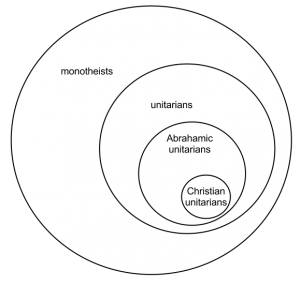Thanks to reader Mike Gant for his question about my last post.
As of now I think I’ve got a solid definition of the concept unitarian: someone who believes that the one God just is (i.e. is numerically identical to) a certain self and not to any other self.
But I then tried to define the more specific concept of a Christian unitarian: someone who believes that the one God just is (i.e. is numerically identical to) a certain self, namely the Father, and not to any other self.
But this is not a good definition. Mike asked: what about ancient friends of God like Moses and Abraham?
D’oh! The above definition makes them Christian unitarians. Thus, it is too “broad” or “wide.” My intent was to distinguish, say, a native American or Hindu unitarian from a Christian unitarian. The definition I offer above does that, but it doesn’t exclude Jews who either (1) never heard of Christianity or (2) disavow Christianity from being “Christian” unitarians.
To try again then: I think what I offered was a definition of the concept of an Abrahamic unitarian. Again: someone who believes that the one God just is (i.e. is numerically identical to) a certain self, namely the Father, and not to any other self. This formula uses a Jesus-specific term (“the Father”) but I think an equivalent definition could be given using any name or title that refers to the same being that “the Father” does in Jesus’ usage. So an equivalent definition would be: someone who believes that the one God just is (i.e. is numerically identical to) a certain self, namely YHWH, and not to any other self.
Christian unitarians, of course, are also Abrahamic unitarians. And so are Jews – at least, Jews who think God to be a great self, and not a force, an ineffable mystery, or a who-knows-what. The main concepts I’m talking about would be related like this:

So far, so good. What then, must be added to the concept of an Abrahamic unitarian to get the more specific concept of a Christian unitarian?
Here’s a New Testament inspired suggestion: the characteristic or defining thesis of a Christian is believing that Jesus is God’s messiah, the anointed one, the Christ. Thus, a unitarian Christian would be defined as an Abrahamic unitarian who accepts the this one true God’s Messiah is the man Jesus.
One may worry that this is still too wide. Does it count Muslims as “Christian unitarians”? One might think so – they claim that Allah (the God) is none other than the one worshiped by Abraham. And the Qur’an says ten times that Jesus is al-masih, “the messiah.” (See van Gorder’s No God but God, pp. 131-4)
But I think the definition is not too wide, for the reason that all Muslims reject the claim that Jesus is God’s messiah as Christians understand that, as “the Lamb of God who takes away the sins of the world” and who even now serves as an intermediary between God and humankind. Also, to accept him as God’s deliverer is to accept his leadership over you, to take Jesus as your Lord, your boss. No Muslim does that; for all the compliments they pay Jesus, they live their lives by the Hadith, the Qur’an, and the traditional interpretations of these.
Does it allow Jehovahs Witnesses? I think so. Mormons? Possibly – not unless they are monotheists; one must be that to be any sort of unitarian.
Any counterexamples to this definition?
The post Defining the concept of a Christian unitarian appeared first on Trinities.
